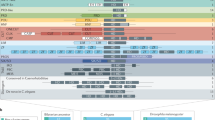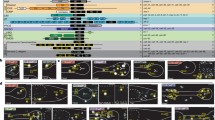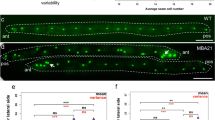Abstract
The nematode Caenorhabditis elegans develops by an essentially invariant sequence of cell divisions1–3 leading to an adult complement of 959 somatic cells. In this organism cell fate is correlated with cell lineage, suggesting that genealogy may be a determining factor for the differentiated state of a cell. The study of mutants with altered cell lineages may help elucidate the precise mechanisms by which cell fate is decided. Several cell lineage mutants have been isolated and characterized4,5, some having more and some fewer cell divisions than wild type. We have now investigated the cell types produced by two cell lineage mutants; these mutants exhibit blocks in certain terminal or near terminal cell divisions, which in normal animals generally give rise to daughter cells that differentiate into distinctly different cell types. We find that the blocked cells in the mutants generally exhibit the differentiated characteristics of only one of the two daughter cells that normally would be produced. The differentiated state of the blocked precursors may be due to an intrinsic dominance of one cell type over another hi what is essentially a fused cell, and/or it may reveal the state of commitment of the precursor in wild-type animals.
This is a preview of subscription content, access via your institution
Access options
Subscribe to this journal
Receive 51 print issues and online access
$199.00 per year
only $3.90 per issue
Buy this article
- Purchase on Springer Link
- Instant access to full article PDF
Prices may be subject to local taxes which are calculated during checkout
Similar content being viewed by others
References
Sulston, J. E. & Horvitz, H. R. Devl Biol. 56, 110–156 (1977).
Kimble, J. & Hirsh, D. Devl Biol. 70, 396–417 (1979).
Deppe, U. et al. Proc. natn. Acad. Sci. U.S.A. 75, 376–380 (1978).
Horvitz, R. & Sulston, J. Genetics 96, 435–454 (1980).
Sulston, J. & Horvitz, R. Devl Biol. 82, 41–55 (1981).
White, J., Southgate, E., Thomson, N. & Brenner, S. Phil. Trans. R. Soc. B275, 327–348 (1976).
Albertson, D., Sulston, J. & White, J. Devl. Biol. 63, 165–178.
White, J., Albertson, D. & Anness, M. Nature 271, 746–766 (1978).
Whittaker, J. R. Proc. natn. Acad. Sci. U.S.A. 70, 2096–2100 (1973).
Laufer, J., Bazzicalupo, P. & Wood, W. Cell 19, 569–577 (1980).
Davidson, R. L. in Somatic Cell Hybridization (eds Davidson, R. L. & de la Cruz, F.) 131–150 (Raven, New York, 1974).
Reichardt, L. & Patterson, P. Nature 270, 147–151 (1977).
Chalfie, M., Horvitz, R. & Sulston, J. Cell 24, 59–69 (1981).
Sulston, J. E. & White, J. G. Devl Biol. 78, 577–598 (1980).
Satoh, N. & Susumu, I. J. Embryol. exp. Morph. 61, 1–13 (1981).
Author information
Authors and Affiliations
Rights and permissions
About this article
Cite this article
White, J., Horvitz, H. & Sulston, J. Neurone differentiation in cell lineage mutants of Caenorhabditis elegans. Nature 297, 584–587 (1982). https://doi.org/10.1038/297584a0
Received:
Accepted:
Issue Date:
DOI: https://doi.org/10.1038/297584a0
This article is cited by
-
Septins promote dendrite and axon development by negatively regulating microtubule stability via HDAC6-mediated deacetylation
Nature Communications (2013)
-
C. elegans cell cycles: invariance and stem cell divisions
Nature Reviews Molecular Cell Biology (2005)
-
Genetic and fine structure analysis of unc-26(IV) and adjacent regions in Caenorhabditis elegans
Molecular and General Genetics MGG (1990)
Comments
By submitting a comment you agree to abide by our Terms and Community Guidelines. If you find something abusive or that does not comply with our terms or guidelines please flag it as inappropriate.



